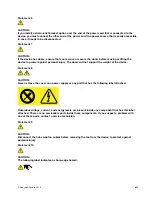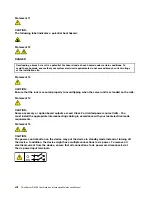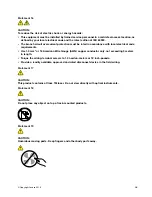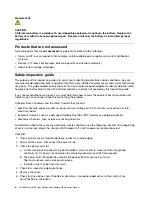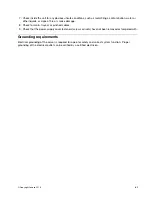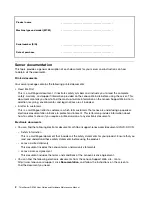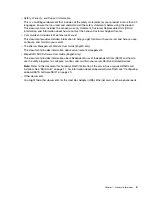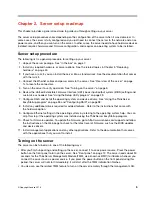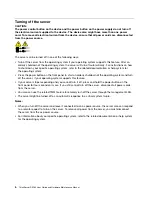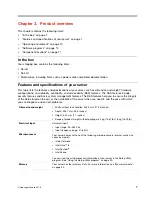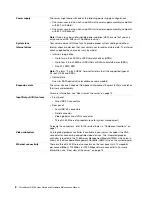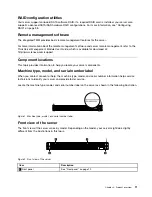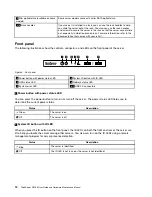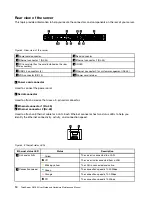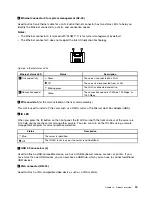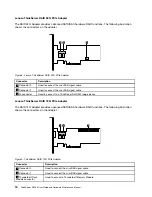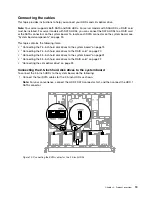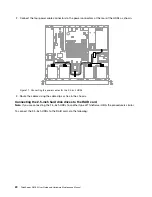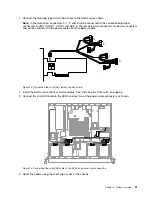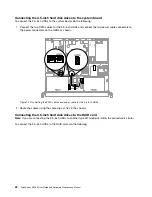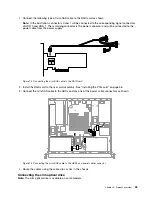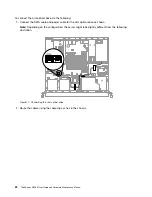
Security features
• Supervisor password and user password to help protect unauthorized access
to the server (see “Using passwords” on page 32)
• ThinkServer Trusted Platform Module (TPM), which is a security chip, to help
enhance server security
• Remote monitoring or control by an administrator to provide protection or help
• RAID configuration to help improve data storage reliability and fault tolerance
(see “Configuring RAID” on page 38)
Basic system management
features
• Ability to store the power-on self-test (POST) hardware test results
• Setup Utility program
The Setup Utility program helps you view the server information and configure
the server in the pre-operating system environment. See “Using the Setup Utility
program” on page 29.
• TMM (also known as BMC) and Intelligent Platform Management Interface (IPMI)
2.0
The system board platform management subsystem is based on the integrated
TMM features. The TMM is a management chip that is integrated on the system
board of your server. With the TMM, no matter what condition the server
operating system is in and no matter if the server is on or off, as long as the
server is connected to network and an ac power source, the interaction with the
TMM-controlled servers can be achieved through system network. The user can
obtain the server hardware health information and system event log (SEL), and is
able to conduct the operations including turning on or off the server, restarting
the server, and so on. This part of server management is independent of the
operating system and is called out-of-band management.
The system board platform management subsystem consists of the integrated
TMM, communication buses, sensors, the BIOS, and server management
firmware. The subsystem is responsible for error reporting, system power control,
thermal monitoring, system fan control, and other management features. The
TMM provides system management and monitoring features based on the IPMI
2.0 specification. IPMI helps lower the overall costs of server management. For
more information about IPMI 2.0, go to the Intel Web site at:
https://www-ssl.intel.com/content/www/us/en/servers/ipmi/ipmi-home.html
The TMM also supports some non-IPMI features, such as the Dynamic Host
Configuration Protocol (DHCP) and the Platform Environment Control Interface
(PECI), to provide more system management functions.
You can find the default user name, password, and other information for the
TMM in the
ThinkServer Management Module User Guide
, which is available for
download at:
http://www.lenovo.com/support
• Preboot Execution Environment (PXE)
The Intel PXE technology enables you to start your servers, load an operating
system, or deploy executable images from a remote server by using a network
interface. The operation can be done independently of local data storage devices
(such as HDDs) or installed operating systems.
• RAID
Your server supports onboard SATA software RAID. If a required RAID card
is installed, your server also supports advanced SATA/SAS hardware RAID
configurations. For more information, see “Configuring RAID” on page 38.
• Status light-emitting diodes (LEDs) and diagnostic LEDs
For more information about the LEDs for your server, refer to the related topics in
“Component locations” on page 11.
• Software programs
For more information about the software programs, see “Software programs”
on page 10.
9
Summary of Contents for ThinkServer RS160
Page 14: ...xii ThinkServer RS160 User Guide and Hardware Maintenance Manual ...
Page 18: ...4 ThinkServer RS160 User Guide and Hardware Maintenance Manual ...
Page 42: ...28 ThinkServer RS160 User Guide and Hardware Maintenance Manual ...
Page 58: ...44 ThinkServer RS160 User Guide and Hardware Maintenance Manual ...
Page 118: ...104 ThinkServer RS160 User Guide and Hardware Maintenance Manual ...
Page 130: ...116 ThinkServer RS160 User Guide and Hardware Maintenance Manual ...
Page 141: ......
Page 142: ......

